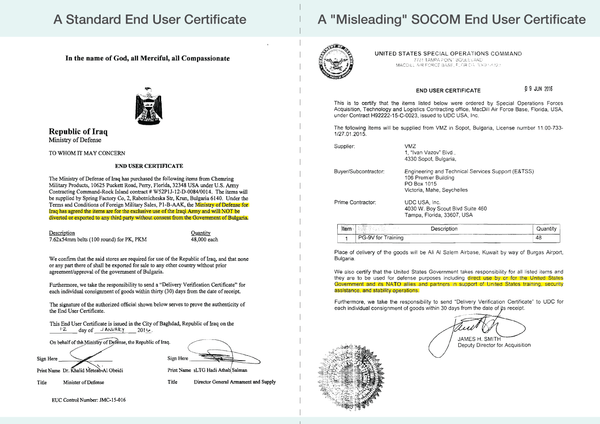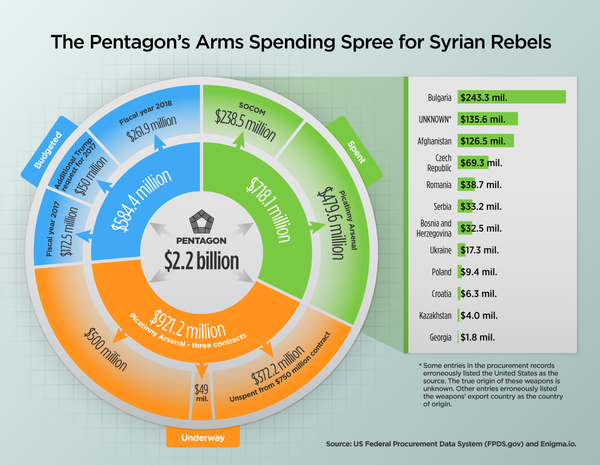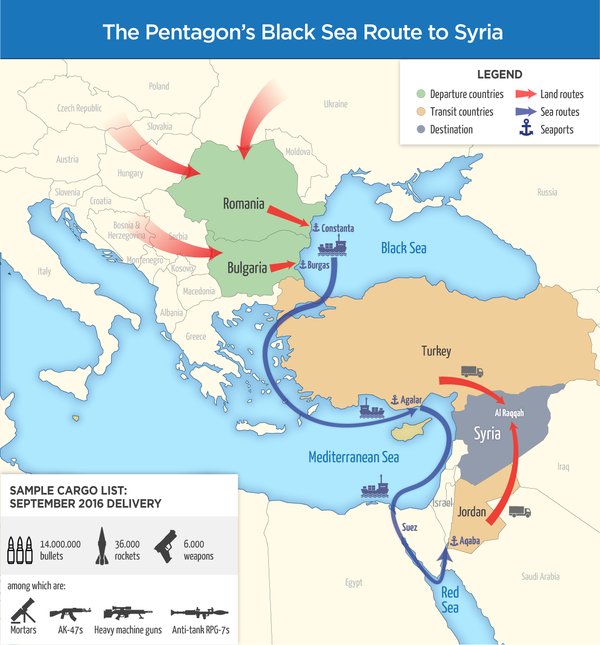According to the report the Pentagon is working with various contractors and sub-contractors in Eastern Europe and the post-Soviet states to implement an arms and ammunition supply program that will cost $2.2 billion.
The program is separate from the now-defunct Syrian Train and Equip program. It was reportedly started in September 2015 and the first delivery arrived in October 2015. Since then, the Pentagon has spent more than $700 million funding its operations. The Department of Defense has also budgeted an additional $584 million for the program for 2017 and 2018, and over $900 million has been contracted to be spent by 2022.
According to the investigation, the Pentagon is buying the munitions through two channels: the Special Operations Command (SOCOM) and the Picatinny Arsenal, a US Army weapons facility in New Jersey. The supplies are transported by sea and air from Europe to Turkey, Jordan and Kuwait and then distributed to US allied rebel forces in northern and southern Syria. This equipment reportedly includes firearms, mortars, AK-47 rifles, heavy machine guns, RPGs and various types of ammunition.
In providing Syrian rebels with weapons, the Pentagon has used "unusual and misleading documentation" that exploits a "loophole" in the mechanism aimed at preventing diversion of arms to terrorists or war criminals, the report claimed.
"But a certificate issued by SOCOM under the Syria program and seen by reporters does not mention Syria as the final destination. Instead, it lists SOCOM as the final user. [This] allows SOCOM to divert the equipment to any army or militia to whom it is providing security assistance, including Syrian rebels," the report read.
According to experts, such practices pose a danger to the global arms control mechanism.
"An end user certificate that did not contain [the final destination] would be self-defeating and highly unusual. The US is undermining the object and purpose of the ATT," Patrick Wilcken, a researcher on arms control and human rights at Amnesty International, was quoted as saying in the report.

Despite the fact that Washington has not yet ratified the ATT and therefore is not legally bound by it, as a signatory the US is expected not to violate it. However, according to Wilcken, the munition supplies to Syrian rebels seem to be undermining the treaty.
Pentagon Says Arms Supplies to Syria are Under Control
Sputnik reached out to the OCCRP for a comment on the investigation.
"Our policy is to let our stories speak for themselves," Drew Sullivan, an OCCRP editor, wrote in his response.
At the same time, Sputnik has been able to obtain a comment from a US Department of Defense spokesperson, who said that the Pentagon controls the end use of the weapons supplied to Syrian rebels.
"The DoD is working closely with the State Department, NATO allies and European partners on a range of mutually important issues, including the supplies of weapons, ammunition and military equipment. The Pentagon vets its allied forces before supplying arms to them and controls the end use of the equipment provided," Spokesperson Michelle Baldanza told Sputnik.
She also stressed that all required end-user certificates are properly agreed with each of the contractors the Pentagon is working with under the program.





